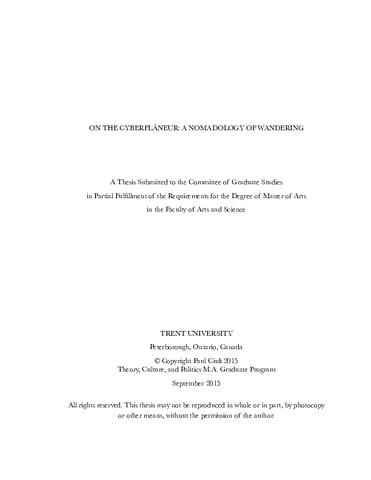application/pdf
Becoming and Destiny in Deleuze and Guattari
This thesis is an investigation of the theme of freedom in the work of Gilles Deleuze and Felix Guattari. Chapter One investigates Deleuze and Guattari's concept of becoming as it is articulated in their book A Thousand Plateaus, and seeks to resolve a problem related to their shifting descriptions of the role of agency in the process of becoming, at times described as voluntary, and at other times described as involuntary. We conclude that chapter with a defense of the claim that their shifting descriptions are unproblematic and are, in fact, attempts to illustrate the paradoxical experience of becoming. Chapter Two investigates Deleuze's earlier text, The Logic of Sense, and attempts to make sense of his use of the term destiny. Our conclusion in that chapter is that destiny is neither necessity, pure self-authorship, nor passive resignation, but rather consists of a mixture of activity and passivity, willfulness and chance.
Author Keywords: Agency, Becoming, Counter-actualization, Deleuze and Guattari, Destiny, Freedom
On the Cyberflaneur: A Nomadology of Wandering
This thesis is a critical response to Evgeny Morozov's article proclaiming the death of the cyberflâneur. Suspicious of the superficiality of his argument, I developed a practico-theoretical project to prove that the cyberflâneur is not dead but alive – or, if it were dead, to rescue it from its grave and bring it back to life. In the course of my response to Morozov, I develop a theoretical foundation that allows me to continue thinking about the concept and practice of the cyberflâneur in the context of the Internet. In doing so, I rely on Gilles Deleuze and Felix Guattari's "Treatise on Nomadology: The War Machine" (2011), in combination with a history of the tradition of wandering. We are living in a postmodern-posthuman era driven by the chaotic and confusing forces that are manifested through the Internet. As such, it is no longer enough to be concerned with opening the space where we live, move and think; we cannot retreat to nature, we can't escape society. However, I see potential in the Internet. The Internet, as a physical and material network, can be actualized as an apparatus of capture. It operates as a medium for accelerating or limiting speed, or as an apparatus for the control of the transmission of information. I develop the cyberflâneur as an aesthetic figure that reveals the Internet's potential. If these revelations happen to be transmitted, then everyday life can again become an object of dispute, rather than unmeditated habituation.
Author Keywords: Cyberflâneur, Everyday Life, Internet, Nomadology, Research-creation, Wandering
Nietzsche and Deleuze: On the Overman, the Nomad and the Eternal Recurrence
Gilles Deleuze claims that understanding the eternal recurrence as a recurrence of the same is a misreading of Friedrich Nietzsche, yet, this assertion is not supported by Nietzsche's texts. In all instances where Nietzsche describes the eternal recurrence, he emphasizes that it is one of the same events. One's willingness to love one's fate and to will the eternal recurrence of the same represents the psychological state of the Overman and his achievement of joyousness. However, this is at odds with Deleuze and Felix Guattari's conception of the nomad.
Consequently, the nomad and the Overman are not congruous at all. Rather, the nomad is Nietzsche's lion. The eternal return of the different then describes the psychological state of the lion as a precursor to the psychological state of the Overman.
The lion cannot will the eternal recurrence of the same; he must will the eternal recurrence of the different. When the lion becomes the child, he has the psychological perspective within which to will the eternal recurrence of the same. It is in this sense that Nietzsche and Deleuze's versions of the eternal recurrence are not antithetical – they are complementary and represent a progression of psychological thought.
Author Keywords: Eternal Recurrence, Friedrich Nietzsche, Gilles Deleuze, Nihilism, Nomad, Overman
The Shaman Detective: A Comparative Reading of Enchantment and Animism in Contemporary Japanese Detective Fiction
This thesis examines a specific figure that appears throughout contemporary Japanese detective fiction (across different media), which I have termed the Shaman detective. A liminal figure that combines Japanese folk cosmologies with contemporary detective work, the Shaman detective is at once similar to, yet separate from, western postmodernist detective fiction. Invested in narratives of enchantment the Shaman detective is marked by his rejection of the epistemological ties of the modern and classical detectives that cause his counterparts to fail in the face of postmodern subjectivism. Committed to il-logic, dreaming, play, and intuition, the Shaman detective exists in the realm of the Fantastic, bridging the gap between mundane and marvellous realities. This thesis reads Shaman detective texts using western postmodernist theory with Todorov's theory of the Fantastic and Jane Bennett's New Materialism. This is synthesized with Japanese thought traditions, cosmologies and philosophies, in order to draw out the Shaman detective.
Author Keywords: Enchantment, Japanese Fiction, New Materialism, Postmodern Fiction, Shamanism, the Fantastic
Social thermoregulation and potential for heterothermy: seasonal energy conservation strategies in flying squirrels
Northern and southern flying squirrels (Glaucomys sabrinus and G. volans, respectively) are experiencing a climate change induced increase in range overlap, resulting in recent hybridization. We investigated the occurrence of heterospecific communal nesting, a potential facilitator of hybridization, and aimed to confirm the presence of torpor, a potential barrier to hybridization, in flying squirrels. In wild-caught captive squirrels, we conducted a paired nest choice experiment and found that heterospecific nesting did occur, but in a lower frequency than conspecific nesting. Ambient temperature did not affect the frequency of grouped nesting. We attempted to induce torpor in flying squirrels in a laboratory through cold exposure while measuring metabolic rate and body temperature. Strong evidence of torpor was not observed, and metabolic rate remained unchanged with season. We conclude that torpor is not a barrier to hybridization in flying squirrels, but resistance to heterospecific nesting may indicate the existence of one.
Author Keywords: heterospecific group, hybridization, northern flying squirrel, social thermoregulation, southern flying squirrel, torpor
Becoming Hybrid: Towards a Critical Theory of Agency in War
Institutional military strategists are developing theories of asymmetric and unconventional warfare that complicate the notion of strategic agency, the idea that military action emanates from a coherent agential source or subjectivity. This thesis attempts to push the conceptual trajectories of the theories of Hybrid War, Unrestricted War and Onto-power towards an even more radical complication of the notion of strategy - towards an ecological understanding of war as an unwinnable, self-perpetuating process. Recent geopolitical events are meticulously examined, as are institutional doctrinal and theoretical frameworks that stop just short of imploding the conventional agential notion of strategy. Insights from the work of Gilles Deleuze and Felix Guattari, as well as Brian Massumi, particularly the concepts of multiplicity, assemblage, and ontopower, are employed in the thesis, which is itself a "heterogeneous assemblage" of elements ranging from Israeli war theory and Chinese military doctrine to etymology and post-structuralist philosophy.
Author Keywords: Agency, Assemblage, Deleuze, Hybrid warfare, Multiplicity, Strategy
Modeling drought derivatives in arid regions: a case study in Qatar
We propose a stochastic weather model based on temperature, precipitation, humidity and wind speed for Qatar, as a representative arid region, in order to obtain simulated values for a drought index. As a drought index, the Reconnaissance Drought Index (RDI) is commonly accepted in agriculture and is used to measure drought severity. It can be used to price weather derivatives to help farmers reduce nancial losses from drought. RDI, which is the ratio of precipitation to evapotranspiration, is calculated by considering crop growth stages. The use of dierent crop coecient value depending on the growth stage to calculate evapotranspiration can provide improved values for RDI. Additionally, six calculation methods for evapotranspiration using weather data are investigated to obtain accurate values for RDI.
Author Keywords: Evapotranspiration, Markov chains, Mean reversion processes, Reconnaissance Drought Index, Stochastic dierential equations, Stochastic weather models
While the Lonely Mingle with Circumstance: Levinas and the Politics of Ethical Subjectivity
Emmanuel Levinas' philosophy focuses on the idea that no human subject exists outside of their relationship to other people. Each of us holds a profound degree of responsibility to and for all others. Since responsibility is fundamental to human (co)existence, it does not impede on freedom but proves that the sovereign individual is a dangerous myth: any philosophical, political or economic system which places us in antagonism is inherently violent and arguably fallacious. Many instances of injustice and violence can be attributed to advances in technological rationality and other forces of modern egoism with historical roots. By forwarding a somewhat politicized interpretation of Totality and Infinity and drawing on Jacques Derrida's landmark reading of Levinas, this thesis explores the implications of Levinas' thought for modern politics and the potential of Levinasian ethics as a remedy for both the alienation of the modern subject and the continued justification of oppression.
Author Keywords: Ethics, Levinas, Other, Relation, Responsibility, Subjectivity
On Tilt: The Inheritance and Inheritors of Digital Games
On Tilt: The Inheritance and Inheritors of Digital Games accepts and extends Eric Zimmerman's contention that literacies currently being developed during video-game play will be more broadly applicable (outside games) in the next hundred years as Western work, education, entertainment, and citizenship spaces become ever more shaped like video games.
To the end of better understanding both video games and the players and literacies contiguous with them, this dissertation interrogates comparisons between video games and... non-digital games, film and other fictional texts and worlds, blogs, casinos' games of chance, and the strategies employed by face-to-face criminals, always asking about the roles and responsibilities the human participants in these systems take; that is, this dissertation investigates what video games inherit from other forms of art, including non-digital games, and what the gamers and audience of today and tomorrow inherit through their contact with video games.
The dissertation examines in detail works by Jodi Dean, Bernard Suits, Bruce Sterling, T. L. Taylor, Walter Benjamin, Gavin de Becker, N. Katherine Hayles and Nicholas Gessler, and Katie Salen and Eric Zimmerman, considering their work, the video game, and gamers, in terms of power gaming, genre, fiction and suspension of disbelief, audience, motivations, fungibility, the zombie vs. the robot, value vs. meaning, agency, slipstream, capitalism, and ontology.
Ultimately, the dissertation suggests that there are two disparate strains of gamification building Zimmerman's future, arguing first that the penetration of video games into culture is changing the way we behave and exist as audience and more generally, and, second, that what is at stake, in terms of the attitudes, labels, and gameplay that we accept in terms of games and gamification is significant to what it means to be human, especially within systems that are only partly human, in the next hundred years.
Author Keywords: digital, gamification, genre, literacy, new media, videogame
Doing it Right: Eliminating Mercury Use in Gold Mining in Guyana
The cyanidation technique is currently a viable technique for gold recovery that can replace the present amalgamation technique in Guyana. To implement this technique effectively, laboratory scale experiments and at scale runs were conducted to determine the best particle size of the ore, cyanide concentration, and leaching time. In addition, the profitability of cyanidation was compared to the amalgamation technique so as to describe the economic value of cyanidation. Results indicated that up to 94% of gold can be recovered from the ore using an ore particle size of 150 (105 µm), meshes, a cyanide concentration of 0.05% and leaching for 24 h. An economic comparison of this technique with the amalgamation technique indicated that although initial costs are high for the cyanidation technique, profits as high as 83% can be achieved after initializing this method whereas profits would be capped at approximately 25% for the amalgamation technique.
Keywords: gold recovery, cyanidation, mercury amalgamation, activated car
Author Keywords: activated carbon, cyanidation, gold recovery, mercury amalgamation









